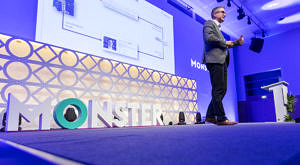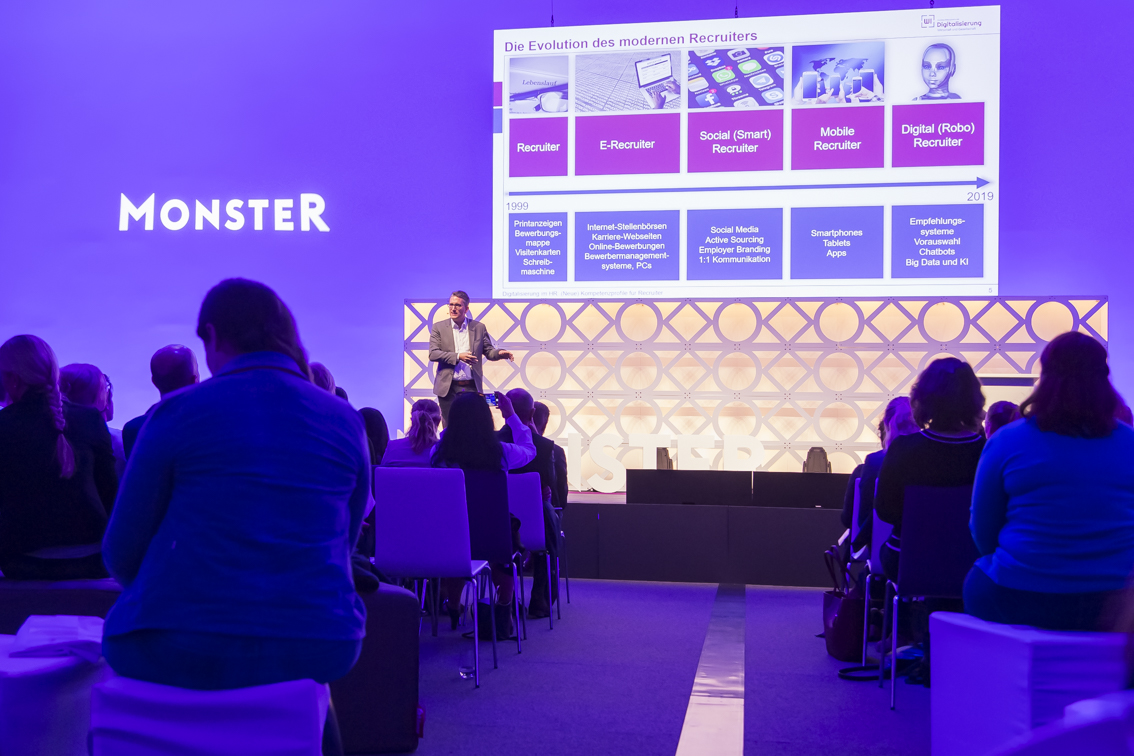New competence profiles for recruiters
At the 17th Symposium for HR Managers in Frankfurt of the career portal monster.de, Prof. Dr. Sven Laumer presented conclusions from the new edition of Recruiting Trends 2019 in a keynote speech and pointed out which new competence profiles arise for Recrutier due to digitalization. The symposium was held under the motto ” Digitization vs. Human First”, whereby Prof. Laumer emphasized in his contribution that this is not a question of “either or”, but rather a question of “and”. Through the interaction of people and digitisation, HR tasks can be rethought and better designed. In an interview Prof. Laumer explains the core results of the recruiting trends and the effects on the competence profiles of recruiters.
Recruiters currently have little fear of losing their job as a result of digitization – but the recruiter’s job profile will change again in the coming years. Where is the journey going?
Prof. Laumer: Nine out of ten recruiters from the largest German companies currently believe that it is good to digitize tasks for the effectiveness and efficiency of recruitment. On the other hand, the fear that one’s own workplace will be lost is hardly noticeable among recruiters. Only every twentieth recruiter is currently afraid of losing his or her job as a result of digitization. But one is aware that the digitization of the recruiter’s job profile will change and that one has to adjust and prepare oneself accordingly in the next few years.
Will the fear that the job profile of the recruiter will change as a result of digitization in such a way that personnel will be replaced by machines and thus jobs in human resources will be eliminated be confirmed?
Prof. Laumer: It doesn’t look like recruiter jobs will be eliminated in the next five years. Of course they will change.

What skills does Recruiter 4.0 need and why?
Prof. Laumer: Digitization will change the recruiter’s job profile again, and many current skills will continue to be important in the future, but new ones will also be added. More than half of the recruiters currently expect to be supported by intelligent machines in the future. This also means that the requirements profile for recruiters will change. According to the assessment of the top 1,000 companies, handling technology, apps and gadgets as well as data-based recruiting will be much more important in five years’ time than it is today. Abilities to (pre-)select applicants or to formulate and publish job advertisements will be less important in the future, as these tasks can be performed by recommender systems.
How have the requirements changed in the last 5 years?
Prof. Laumer: The recruiter has developed into a digital recruiter via the E-Recruiter, the Social and Mobile Recruiter. For example, the social media trend has changed the requirements for recruiters. Print media and Internet job exchanges were previously static; however, social networks have created dynamics and a “one-size fits all” approach is no longer appropriate. Social media demand bidirectional communication strategies and recruiters had to start thinking in network structures and understand where to find their target group. However, the development of new technologies will continue to change the requirements. The mobile trend, for example, is calling for the human resources department to deal with mobile recruiting. Currently, one fifth of candidates in their private lives often do not use a terminal device with a keyboard any more. In the meantime, HR must also react to such developments. New technology, such as recommender systems Artificial Intelligence, Virtual Reality and Augmented Reality, will further change these requirements as described above.
A look into the future: New technologies such as Artificial Intelligence, Virtual Reality and Augmented Reality are currently still being used very cautiously in recruitment. Will that stay that way? Which application scenarios are conceivable?
Prof. Laumer: 3.5 percent of the top 1,000 companies plan to take responsibility for artificial intelligence in the future. However, AI is a technology that operates in the background, so recruiters and candidates do not necessarily come into contact with this technology. For example, a recommender system can contain artificial intelligence. Recruiters and candidates, however, only have to deal with their graphical interface and not with the underlying functions and algorithms. One in ten companies plans to use virtual reality applications and 3.5 percent plan to use augmented reality applications. Here, four out of ten companies also see a competitive advantage over their competitors through the use of these new technologies. Furthermore, four out of ten companies are of the opinion that technologies such as VR and AR can increase the enthusiasm of candidates for their own company. In particular, it arouses the enthusiasm of Generation Z candidates.
With all the technical progress: Does recruiting remain human? Will it even become more human because of technology?
Prof. Laumer: Digitalization is supposed to help people gain advantages. For example, almost half of the top 1,000 companies believe that IT such as Talent-Recommender make active sourcing less discriminatory. 35 percent of candidates believe that automation helps to make recruitment less discriminatory.

